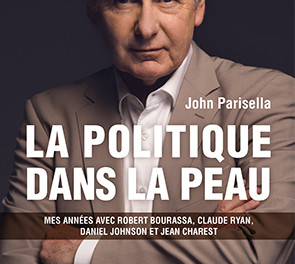Book of the Month Club: La politique dans la peau by John Parisella
“La période d’avril 1981 à 1985 en fut une ressourcement sur des enjeux politiques qui allaient animer les prochaines années. […] Je n’avais pas perdu le goût de la politique. Maintenant, j’étais certain que je voulais aller plus loin et server au-delà du parti.
Robert Bourassa m’avait laissé la porte ouverte.”
In December of 1985, Bourassa led the Liberal Party of Quebec to a massive victory of 99 seats in the Assemblée nationale, but ironically had failed to win his own seat of Bertrand (now the electoral district of Montarville). However, as those versed in politics know, you can’t keep a good man down. This January marks thirty years since Quebec premier Robert Bourassa was elected in Saint-Laurent in 1986. Premier once before in the 1970s, when Bourassa returned to politics in the 1980s, Quebec was a different landscape, somewhat changed but somewhat the same. Already an immense help during his first term as Premier, by his side during his second mandate was his right hand man, John Parisella.
To understand Parisella’s passionately argued beliefs, one must understand the man himself. Issued from the Anglophone community, Parisella grew up perfectly bilingual in a Francophone community under the shadow of Quebec Premier Duplessis, a Quebec nationalist, and Canadian Prime Minister Pearson, an ardent federalist. True to his roots, Parisella became a valued member of the Liberal Party of Quebec and an important voice for the advancement of Francophone culture and society with an emphasis on diversity and togetherness. With the belief there is no “two solitudes” (the cultural, not just linguistic, divide between English and French-speaking Quebecers), he is the true bridge between communities and indeed between countries: he was named the Quebec delegate to New York by Premier Jean Charest.
While the book’s subtitle mentions Claude Ryan and Jean Charest, the bulk of Parisella’s book is dedicated to his years with Robert Bourassa. During the Bourassa years, Parisella was the main media person as well as the director general of the Liberal Party. Ryan, the leader of the Liberal Party before Bourassa, figures predominantly in Parisella’s early years, when he was starting out with his involvement in the Liberal party. The book is honestly written, critical and retrospective about his choices, sharing good times and bad. Parisella discloses candid memories involving some of the very top Quebec politicians of the day. A particular instance that stood out were his years as a teacher in the English system: he invited the very charismatic René Lévesque to his school to speak about “the other side” of Quebec politics; upon his arrival in the gymnasium, Lévesque lit up a cigarette under a “no smoking” sign and shrugged. The talk was a huge success, and the sovereignty movement was no longer a fearful shadow now that its principles and main ideas were given none other than by the foreman of the modern sovereignty movement. Parisella’s reminiscences of Robert Bourassa are particularly well written and touching. Far from being the indecisive politician of jokes, Parisella shows that Bourassa was a cautious man, silent as to listen to points of view, and courageous and strong until his untimely death.
Now somewhat retired from politics (although one can never be sure about these things), Parisella devotes the last few chapters of his book to give his point of view on current issues. As always, current issues have threads of the past running through them, and they are all apparent in issues such as the ongoing language debate and the issues surrounding diversity.
Parisella’s overwhelming optimism in his book is infectious. A great book for anyone interested in Quebec politics from a very particular point of view in an incomparable time. Recommended.






